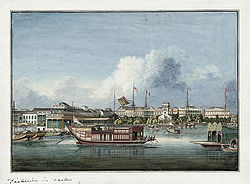
Back Sistema de Canton Catalan Kantonsystemet Danish Kanton-System (China) German Sistema de Cantón Spanish نظام تجاری تکبندری Persian Sistem Kanton ID Sistema di Canton Italian 広東システム Japanese 광동 체제 Korean Sistem Canton Malay
| Canton System | |||||||||||||
|---|---|---|---|---|---|---|---|---|---|---|---|---|---|
| Chinese | 一口通商 | ||||||||||||
| |||||||||||||


The Canton System (1757–1842; Chinese: 一口通商; pinyin: Yīkǒu tōngshāng; Jyutping: jat1 hau2 tung1 soeng1, lit. "Single [port] trading relations") served as a means for Qing China to control trade with the West within its own country by focusing all trade on the southern port of Canton (now Guangzhou). The protectionist policy arose in 1757 as a response to a perceived political and commercial threat from abroad on the part of successive Chinese emperors.
From the late seventeenth century onwards, Chinese merchants, known as Hongs (Chinese: 行; pinyin: háng), managed all trade in the port. Operating from the Thirteen Factories located on the banks of the Pearl River outside Canton, in 1760, by order of the Qing Qianlong Emperor, they became officially sanctioned as a monopoly known as the Cohong. Thereafter Chinese merchants dealing with foreign trade (Chinese: 洋行; pinyin: yángháng; Jyutping: joeng4 hong2; lit. "ocean traders", i.e. "overseas traders" or "foreign traders") acted through the Cohong under the supervision of the Guangdong Customs Supervisor (Chinese: 粵海關部監督; pinyin: Yuèhǎi guānbù jiàn dù; Jyutping: jyut6 hoi2 gwaan1 bou6 gaam1 duk1), informally known as the "Hoppo", and the Governor-general of Guangzhou and Guangxi.
- ^ "Scene in China" (PDF). The Wesleyan Juvenile Offering: A Miscellany of Missionary Information for Young Persons. IX. Wesleyan Missionary Society: Vignette. 1852. Retrieved 24 February 2016.
© MMXXIII Rich X Search. We shall prevail. All rights reserved. Rich X Search